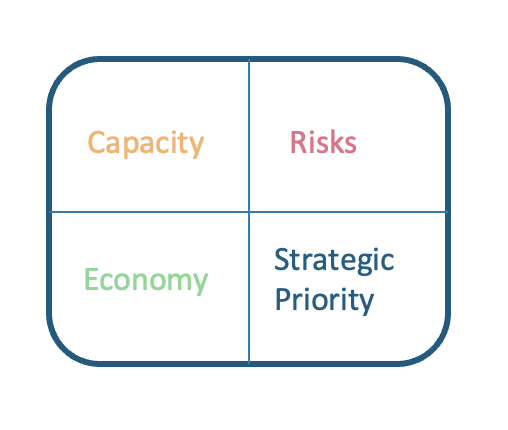Transforming Portfolio Management


SAKET BIVALKAR
Saket’s focus is on helping organisations to become flexible and adaptive, while emphasising that people in the organisation grow as well. His experience includes working with a range of organisations from large, complex global enterprises to small entrepreneurial start-ups.
Transforming Portfolio Management: A Strategic Approach for Business Success.
Companies are constantly faced with the challenge of managing a portfolio of projects & products, while ensuring that capacity is allocated effectively to drive strategic outcomes.
Recent research data reveals that a staggering 79% of business areas feel overwhelmed by the volume of strategically important work compared to their capacity. Surprisingly, 62% admit that no actions are being taken to enhance portfolio management or prioritization processes. Moreover, collaborative behavior has seen an 8% decline since 2022, indicating a need for a more structured approach to portfolio prioritization Ref: BAI March 2024 report .
By focusing on strategy alignment, economic considerations, capacity balancing, and risk mitigation, companies can enhance their portfolio management processes and achieve greater success in their project initiatives.
Operating Model: Ensuring Efficiency and Effectiveness An efficient operating model is crucial for successful portfolio management and prioritisation. By establishing clear processes, roles, and responsibilities, organizations can ensure that projects are executed effectively and resources are allocated efficiently. A well-defined operating model provides the framework for decision-making, collaboration, and accountability, enabling organizations to drive successful portfolio transformation and prioritize initiatives that align with their strategic objectives.
Cost of Delay and Cost of lost opportunity: Maximizing Value and Minimising Waste. Understanding the concept of cost of delay is essential for effective portfolio management. Cost of delay is the profit lost per unit of time due to the absence of a project. By prioritizing projects based on their cost of delay, organizations can maximize value and minimize waste. This approach ensures that resources are allocated to projects that deliver the most value and contribute to the organization’s long-term success.
Collaboration: Fostering effectiveness and efficiency along with Innovation Effective collaboration is crucial for successful portfolio management. Organizations must foster a culture of collaboration and knowledge sharing to ensure that teams are productive and innovative. By promoting collaboration and addressing the challenges that hinder effective collaboration, companies can improve their portfolio management processes and achieve greater success in their project initiatives.
Prioritization Matrix: A Decision-Making Tool for Portfolio Management A Prioritisation Matrix is a decision-making tool that helps organizations evaluate and compare different projects based on their potential benefits, feasibility, and alignment with the company’s goals. By using this matrix, businesses can systematically evaluate and prioritize projects, ensuring that resources are allocated wisely and high-value initiatives are given the attention they deserve.
What might we add in an Prioritisation Matrix?
Strategy: Defining the Right Path
Effective portfolio management starts with aligning projects with the organisation’s strategic objectives. By defining clear strategic goals and ensuring that projects are in line with these objectives, companies can prioritise initiatives that contribute most significantly to their long-term success. Strategic alignment ensures that resources are directed towards projects that have the highest impact on the organisation’s overall strategy.
Economics: Maximizing Returns
Prioritisation based on economic factors is crucial for optimising portfolio management. Companies need to consider factors such as Return on Investment (ROI), cost of lost opportunity, and cost of delay when making decisions about project prioritisation. By evaluating projects/ initiatives based on their economic impact, organisations can ensure that resources are allocated to initiatives that deliver the most value and drive financial success.
Capacity: Balancing Innovation and Business as Usual
Balancing innovation projects with business as usual activities is essential for effective portfolio management. Organizations must ensure that they have the capacity to execute both types of projects successfully. By prioritizing projects based on capacity considerations, companies can avoid overloading their teams and ensure that resources are allocated efficiently to drive innovation while maintaining core business operations.
Risks: Mitigating Potential Threats
Risk assessment is a critical aspect of portfolio prioritization. Companies need to evaluate projects based on technological, economic, social, legal, and operational risks to mitigate potential threats to project success. By calibrating projects based on risk factors, organizations can proactively address challenges and ensure that projects are executed successfully.
Conclusion
In conclusion, portfolio transformation and prioritisations are essential for organisations looking to optimise their project/product portfolios and drive strategic outcomes. By focusing on strategy alignment, economic considerations, capacity balancing, and risk mitigation, companies can enhance their portfolio management processes and achieve greater success in their initiatives.
Related Posts
The Undermining Factors in Business Transformation
Business transformation is the process of fundamentally changing the way an organization operates, delivers value, and competes in the market. It is a strategic initiative that aims to improve performance, efficiency, customer satisfaction, and innovation.
Developing Agile Coaching skills.
Business CoachContinual development of skills is an essential part go professional development of Agile Coaches. But unfortunately, we see a lack of options to know what skills we are good at and what skills to develop further, an assessment, a development tools that...
My experience on Scrum simulation with LEGO
During last week I was running the Agile coaching sessions for 3 teams from one of my clients. For these sessions we did the Simulation of Scrum with Lego which turned out to be very interesting activity for the teams.





